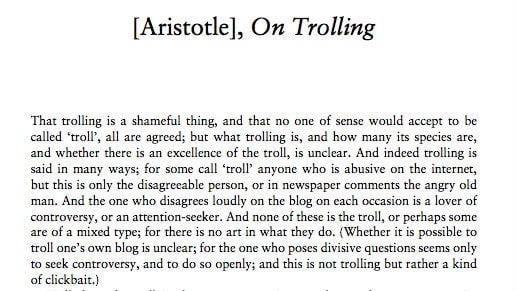“Some say that Socrates was a troll”: An academic paper on trolling, written like Aristotle
Who knew that trolling could be such an erudite subject? The Journal of the American Philosophical Association has published a paper on these hated online pests, written in the style of none other than Aristotle. Of course, it’s been more than a couple of millennia since Aristotle put pen to paper but Rachel Barney, classics and philosophy professor at the University of Toronto, does an excellent job of mimicking his clear prose style.


Who knew that trolling could be such an erudite subject? The Journal of the American Philosophical Association has published a paper on these hated online pests, written in the style of none other than Aristotle. Of course, it’s been more than a couple of millennia since Aristotle put pen to paper but Rachel Barney, classics and philosophy professor at the University of Toronto, does an excellent job of mimicking his clear prose style.
Trolling, which describes inflammatory arguments and related disruptive, antagonistic behavior online, gets a far more precise definition from this philosophical standpoint. In her Aristotelian paper on what, exactly, a troll is, Barney sets out the following points.
- “The troll in the proper sense is one who speaks to a community and as being part of the community; only he is not part of it, but opposed.”
- “And in general the troll says what is false but sounds like the truth—or rather he does not quite say it, but rather something very close to it which is true.”
- “And so he sets the community apart from each other, and introduces strife where before there was scarcely disagreement.”
- “The end of the troll is not in his own speech, then, but in that of the others, when they take up his comments in as many ways as bring regret.”
- “Trolls differ primarily in their for-the-sake-of-which: at any rate some troll for amusement, and a few for profit, but most as enemies and members of a faction.”
The paper goes on to consider “whether there is an art of trolling and an excellence.” After all, “some say that Socrates was a troll.” But this theory is quickly dismissed as follows:
“For Socrates was speaking frankly when he told the Athenians to care for their souls, rather than money and honors, and showed that they lacked knowledge. And this is not trolling but the contrary, exhortation and truth-telling— even if the citizens get very annoyed.”
As such, trolling cannot be considered an art as it has no function and so “it belongs not to the serious person to be a troll but to the one who lacks education.”
Finally, the paper points out that while trolls are particularly pernicious online, they’re also evident among newspaper columnists, members of political meetings, and pretty much any community of speakers. But though we all know trolls must not be fed, this is extremely difficult to adhere to—“for the desire to be right on the internet is natural and present to all.”